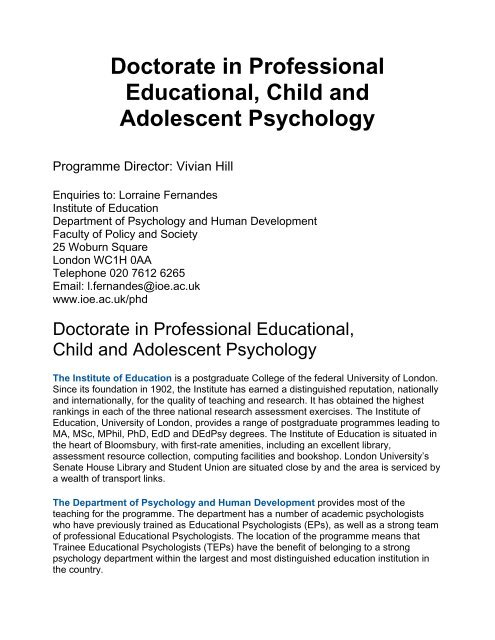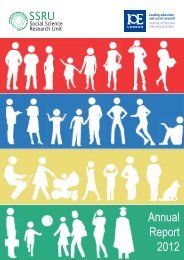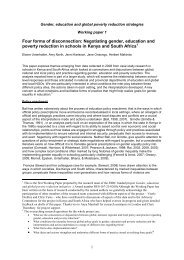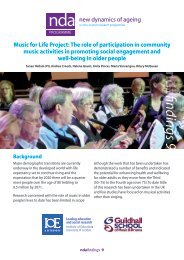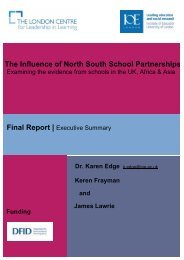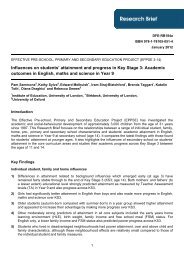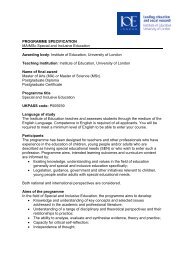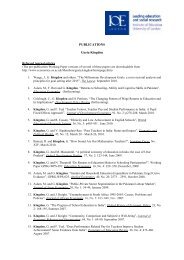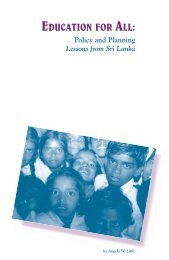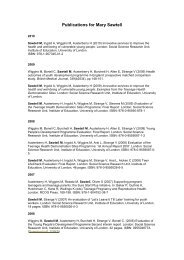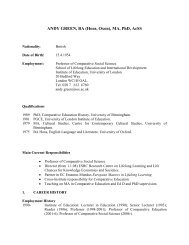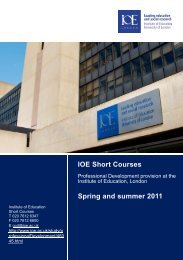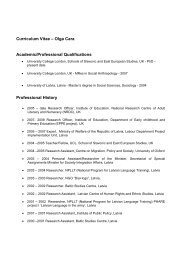Doctorate in Professional - Institute of Education, University of London
Doctorate in Professional - Institute of Education, University of London
Doctorate in Professional - Institute of Education, University of London
Create successful ePaper yourself
Turn your PDF publications into a flip-book with our unique Google optimized e-Paper software.
<strong>Doctorate</strong> <strong>in</strong> <strong>Pr<strong>of</strong>essional</strong><br />
<strong>Education</strong>al, Child and<br />
Adolescent Psychology<br />
Programme Director: Vivian Hill<br />
Enquiries to: Lorra<strong>in</strong>e Fernandes<br />
<strong>Institute</strong> <strong>of</strong> <strong>Education</strong><br />
Department <strong>of</strong> Psychology and Human Development<br />
Faculty <strong>of</strong> Policy and Society<br />
25 Woburn Square<br />
<strong>London</strong> WC1H 0AA<br />
Telephone 020 7612 6265<br />
Email: l.fernandes@ioe.ac.uk<br />
www.ioe.ac.uk/phd<br />
<strong>Doctorate</strong> <strong>in</strong> <strong>Pr<strong>of</strong>essional</strong> <strong>Education</strong>al,<br />
Child and Adolescent Psychology<br />
The <strong>Institute</strong> <strong>of</strong> <strong>Education</strong> is a postgraduate College <strong>of</strong> the federal <strong>University</strong> <strong>of</strong> <strong>London</strong>.<br />
S<strong>in</strong>ce its foundation <strong>in</strong> 1902, the <strong>Institute</strong> has earned a dist<strong>in</strong>guished reputation, nationally<br />
and <strong>in</strong>ternationally, for the quality <strong>of</strong> teach<strong>in</strong>g and research. It has obta<strong>in</strong>ed the highest<br />
rank<strong>in</strong>gs <strong>in</strong> each <strong>of</strong> the three national research assessment exercises. The <strong>Institute</strong> <strong>of</strong><br />
<strong>Education</strong>, <strong>University</strong> <strong>of</strong> <strong>London</strong>, provides a range <strong>of</strong> postgraduate programmes lead<strong>in</strong>g to<br />
MA, MSc, MPhil, PhD, EdD and DEdPsy degrees. The <strong>Institute</strong> <strong>of</strong> <strong>Education</strong> is situated <strong>in</strong><br />
the heart <strong>of</strong> Bloomsbury, with first-rate amenities, <strong>in</strong>clud<strong>in</strong>g an excellent library,<br />
assessment resource collection, comput<strong>in</strong>g facilities and bookshop. <strong>London</strong> <strong>University</strong>’s<br />
Senate House Library and Student Union are situated close by and the area is serviced by<br />
a wealth <strong>of</strong> transport l<strong>in</strong>ks.<br />
The Department <strong>of</strong> Psychology and Human Development provides most <strong>of</strong> the<br />
teach<strong>in</strong>g for the programme. The department has a number <strong>of</strong> academic psychologists<br />
who have previously tra<strong>in</strong>ed as <strong>Education</strong>al Psychologists (EPs), as well as a strong team<br />
<strong>of</strong> pr<strong>of</strong>essional <strong>Education</strong>al Psychologists. The location <strong>of</strong> the programme means that<br />
Tra<strong>in</strong>ee <strong>Education</strong>al Psychologists (TEPs) have the benefit <strong>of</strong> belong<strong>in</strong>g to a strong<br />
psychology department with<strong>in</strong> the largest and most dist<strong>in</strong>guished education <strong>in</strong>stitution <strong>in</strong><br />
the country.
Introduction<br />
The DEdPsy <strong>in</strong> <strong>Pr<strong>of</strong>essional</strong> <strong>Education</strong>al, Child and Adolescent Psychology (DECAP)<br />
programme was launched <strong>in</strong> September 2006. It builds on the <strong>Institute</strong> <strong>of</strong> <strong>Education</strong>’s<br />
established and well respected reputation <strong>in</strong> pr<strong>of</strong>essional educational psychology tra<strong>in</strong><strong>in</strong>g.<br />
Previous British Psychological Society accreditation reports have noted that the<br />
programme benefits from ‘<strong>in</strong>spirational teach<strong>in</strong>g and high quality supervision provided by<br />
the teach<strong>in</strong>g team <strong>of</strong> academic and pr<strong>of</strong>essional psychologists who are at the cutt<strong>in</strong>g edge<br />
<strong>of</strong> educational and psychological research’. The DEdPsy (DECAP) uses contemporary<br />
applications <strong>of</strong> psychology to provide an <strong>in</strong>novative, creative and coherent pr<strong>of</strong>essional<br />
tra<strong>in</strong><strong>in</strong>g <strong>in</strong> educational psychology. The programme has been developed to provide the<br />
academic, theoretical, practical and <strong>in</strong>terpersonal knowledge, skills and expertise to<br />
facilitate high levels <strong>of</strong> pr<strong>of</strong>essional competence <strong>in</strong> applied educational psychology, with<br />
the aim <strong>of</strong> produc<strong>in</strong>g the highest quality new entrants to the pr<strong>of</strong>ession. The programme<br />
extends over three years.<br />
Health Pr<strong>of</strong>essions Council approval<br />
Successful completion <strong>of</strong> this programme provides eligibility to apply for registration with<br />
the Health Pr<strong>of</strong>essions Council (HPC) as a practitioner psychologist. It is a legal<br />
requirement that anyone who wishes to practice us<strong>in</strong>g a title protected by the Health<br />
Pr<strong>of</strong>essions Order 2001 is on the HPC register. For more <strong>in</strong>formation, please see the HPC<br />
website at: www.hpc-uk.org.<br />
British Psychological Society accreditation<br />
The programme is also accredited by the British Psychological Society (BPS). On<br />
successful completion <strong>of</strong> the programme Tra<strong>in</strong>ees are eligible to apply for Chartered status<br />
as an <strong>Education</strong>al Psychologist. For more <strong>in</strong>formation, please see the BPS website at:<br />
www.bps.org.uk<br />
Programme Philosophy and Orientation<br />
The programme philosophy and ethos is derived from Bronfenbrenner’s eco-systemic<br />
model, which acknowledges the role <strong>of</strong> the <strong>in</strong>teract<strong>in</strong>g systems with<strong>in</strong> which educational<br />
psychology is applied. This conceptualisation allows for the systematic review <strong>of</strong> the<br />
contexts and systems that <strong>in</strong>fluence children and young people’s behaviour, learn<strong>in</strong>g and<br />
development. The model acknowledges the symbiotic <strong>in</strong>fluence <strong>of</strong> the political system and<br />
legislation, upon the organisations with<strong>in</strong> which EPs and their role partners operate. The<br />
programme embraces a social constructivist approach and is based on <strong>in</strong>teractionist<br />
psychological perspectives. Thus <strong>in</strong> work<strong>in</strong>g with others, emphasis is given to analys<strong>in</strong>g<br />
needs and problems <strong>in</strong> context, <strong>in</strong> order to develop shared understand<strong>in</strong>gs and to identify<br />
appropriate action; clients and learners are viewed as active participants and partners. The<br />
programme aims to develop applied <strong>Education</strong>al Psychologists who will be able to operate<br />
equally effectively at different levels with<strong>in</strong> the eco-system through their work with children,<br />
their families, teachers and other pr<strong>of</strong>essionals, schools and other organisations, and <strong>in</strong><br />
response to Local Authority/ Children’s Services <strong>in</strong>itiatives and national priorities.<br />
The programme encourages reflection, critical analysis, and active <strong>in</strong>quiry to support the<br />
synthesis <strong>of</strong> theory and practice and the development <strong>of</strong> pr<strong>of</strong>essional <strong>in</strong>tegrity. Regular
<strong>in</strong>dividual and group tutorials encourage and facilitate reflection on pr<strong>of</strong>essional work.<br />
Tra<strong>in</strong>ees use a scientific method approach comb<strong>in</strong>ed with a ‘reflective practitioner’ stance<br />
to develop work<strong>in</strong>g hypotheses that are then used to <strong>in</strong>form assessment and <strong>in</strong>tervention.<br />
We value the opportunities provided by our location to develop practitioners sensitive to<br />
the needs <strong>of</strong> different client groups and <strong>in</strong> particular to experience the diversity <strong>of</strong> the<br />
urban and multi-cultural communities <strong>of</strong> <strong>London</strong>.<br />
Programme Aims<br />
It is acknowledged that Tra<strong>in</strong>ee <strong>Education</strong>al Psychologists br<strong>in</strong>g with them a wide range <strong>of</strong><br />
different relevant experiences and the programme aims to build on these to enhance<br />
personal and pr<strong>of</strong>essional learn<strong>in</strong>g. The programme aims to cover all aspects <strong>of</strong> the work<br />
<strong>of</strong> <strong>Education</strong>al Psychologists and draws on a range <strong>of</strong> theoretical perspectives that <strong>in</strong>form<br />
psychological practice. In particular the programme aims to develop:<br />
• Skills <strong>in</strong> analysis and synthesis <strong>of</strong> psychological knowledge.<br />
• Knowledge and understand<strong>in</strong>g <strong>of</strong> key psychological theories, models and<br />
paradigms <strong>of</strong> relevance to applied educational psychology.<br />
• The ability to make <strong>in</strong>formed decisions about apply<strong>in</strong>g conceptual and theoretical<br />
psychological frameworks <strong>in</strong> pr<strong>of</strong>essional practice.<br />
• The ability to apply an <strong>in</strong>teractionist perspective, when consider<strong>in</strong>g issues <strong>of</strong><br />
relevance to applied educational psychology.<br />
• To understand and work effectively <strong>in</strong> the social, political and legal context <strong>in</strong> which<br />
educational psychology is applied, with particular reference to the <strong>in</strong>fluences <strong>of</strong><br />
legislative frameworks on practice and service delivery.<br />
• Commitment to promot<strong>in</strong>g equality <strong>of</strong> opportunity and <strong>in</strong>clusion through awareness<br />
<strong>of</strong> the potentially damag<strong>in</strong>g effects <strong>of</strong> stereotyp<strong>in</strong>g and prejudice at <strong>in</strong>dividual, group<br />
and organisational levels.<br />
• To apply a range <strong>of</strong> pr<strong>of</strong>essional and <strong>in</strong>terpersonal skills to promote effective<br />
communication with a range <strong>of</strong> clients and role partners.<br />
• To reflect critically on personal practice recognis<strong>in</strong>g <strong>in</strong>ternal and external factors<br />
<strong>in</strong>fluenc<strong>in</strong>g judgements, behaviour and decision-mak<strong>in</strong>g.<br />
• To understand the role <strong>of</strong> the <strong>Education</strong>al Psychologist <strong>in</strong> multidiscipl<strong>in</strong>ary work<br />
contexts through an appreciation <strong>of</strong> different pr<strong>of</strong>essional theoretical perspectives,<br />
social, political and other factors that contribute to different positions and<br />
perspectives.<br />
• Skills to work autonomously and as part <strong>of</strong> a team.<br />
• To be able to develop, plan and carry out research activities. To evaluate outcomes<br />
<strong>of</strong> research and dissem<strong>in</strong>ate <strong>in</strong>formation from the research.<br />
• Manage time and tasks effectively. To be able to communicate effectively for a<br />
range <strong>of</strong> different purposes.<br />
Pedagogy<br />
A comb<strong>in</strong>ation <strong>of</strong> formal teach<strong>in</strong>g and learn<strong>in</strong>g, and practical placement activities,<br />
facilitates the synthesis <strong>of</strong> theory <strong>in</strong>to practice. The programme draws upon a wide range<br />
<strong>of</strong> teach<strong>in</strong>g and learn<strong>in</strong>g methods <strong>in</strong>clud<strong>in</strong>g:<br />
• problem based learn<strong>in</strong>g where complex and multi-faceted pr<strong>of</strong>essional scenarios<br />
are tackled <strong>in</strong> small groups <strong>of</strong> learners facilitated by academic Tutors who are
pr<strong>of</strong>essional <strong>Education</strong>al Psychologists. This is referred to as Contextualised<br />
Psychological Analysis (CPA),<br />
• applied psychological skills lab sessions, where Tra<strong>in</strong>ees have the opportunity to<br />
practise and develop pr<strong>of</strong>essional skills prior to work<strong>in</strong>g directly with clients, and<br />
• lectures, sem<strong>in</strong>ars, role-play, group work, workshops, video work and <strong>in</strong>dividual<br />
tutorials.<br />
Collaborative <strong>in</strong>quiry is at the heart <strong>of</strong> the learn<strong>in</strong>g process; as the exchange <strong>of</strong> views that<br />
occurs is seen as an important means for develop<strong>in</strong>g hypotheses and embedd<strong>in</strong>g theory <strong>in</strong><br />
practice. The active participation <strong>of</strong> Tra<strong>in</strong>ees supports the assimilation <strong>of</strong> new <strong>in</strong>formation<br />
<strong>in</strong> an analytical and critical way.<br />
Contextualised Psychological Analysis<br />
The CPA approach aims to promote the pr<strong>of</strong>essional qualities and transferable skills<br />
necessary <strong>in</strong> applied educational psychology at doctoral level: CPAs are based on<br />
adapted case scenarios from pr<strong>of</strong>essional EP work. Tra<strong>in</strong>ees take pr<strong>of</strong>essional<br />
responsibility for develop<strong>in</strong>g an understand<strong>in</strong>g and formulat<strong>in</strong>g an appropriate response to<br />
complex and challeng<strong>in</strong>g pr<strong>of</strong>essional scenarios, facilitated by the Tutor us<strong>in</strong>g a staged<br />
approach to problem analysis:<br />
1) discuss and def<strong>in</strong>e the problem,<br />
2) access, evaluate and utilise <strong>in</strong>formation,<br />
3) synthesise, report and evaluate.<br />
These activities have both a self-directed learn<strong>in</strong>g and small group focus, to help develop<br />
both collaborative and <strong>in</strong>dependent pr<strong>of</strong>essional skills. This approach enables Tra<strong>in</strong>ees to<br />
demonstrate some <strong>of</strong> the key qualities that <strong>in</strong>dicate a level <strong>of</strong> function<strong>in</strong>g, suitable for<br />
semiautonomous pr<strong>of</strong>essional practice and competence at doctoral level, namely the<br />
ability to:<br />
• Systematically acquire, understand and utilize a significant body <strong>of</strong> psychological<br />
and educational knowledge, which contributes to the vanguard <strong>of</strong> pr<strong>of</strong>essional<br />
educational psychology practice;<br />
• Draw on psychological, educational and pr<strong>of</strong>essional knowledge and experiences,<br />
to develop <strong>in</strong>formed pr<strong>of</strong>essional judgments derived from the evidence available<br />
regard<strong>in</strong>g complex situations;<br />
• To be able to communicate hypotheses and conclusions succ<strong>in</strong>ctly and efficiently,<br />
to pr<strong>of</strong>essional role partners and parents;<br />
• Demonstrate pr<strong>of</strong>essional competence <strong>in</strong> <strong>in</strong>terpersonal <strong>in</strong>teractions and the<br />
application <strong>of</strong> theoretical and practice skills <strong>in</strong> educational psychology.<br />
Skills Lab<br />
The purpose <strong>of</strong> the skills lab sessions is to support Tra<strong>in</strong>ees <strong>in</strong> the development <strong>of</strong><br />
pr<strong>of</strong>essional practice skills <strong>in</strong> a safe and facilitative environment. This will <strong>in</strong>clude<br />
familiarisation with assessment tools, facilitat<strong>in</strong>g a consultation meet<strong>in</strong>g, learn<strong>in</strong>g to use<br />
applied psychological approaches, such as Cognitive Behavioural Therapy (CBT), or<br />
strategies for manag<strong>in</strong>g a difficult meet<strong>in</strong>g, before apply<strong>in</strong>g these skills with clients <strong>in</strong> the<br />
field.
Structure<br />
The Programme extends over three calendar years, from September to August. Dur<strong>in</strong>g the<br />
first year, Tra<strong>in</strong>ees spend a substantial amount <strong>of</strong> their time engaged <strong>in</strong> learn<strong>in</strong>g activities<br />
at the university. In addition, they undertake a variety <strong>of</strong> placements that have been<br />
designed to help support the <strong>in</strong>tegration <strong>of</strong> theory and practice and to enable them to<br />
become familiar with the contexts <strong>in</strong> which educational psychology is applied. One day<br />
each week is dedicated to the essential learn<strong>in</strong>g processes <strong>of</strong> read<strong>in</strong>g, personal study and<br />
reflection, as well as the preparation <strong>of</strong> programme work. At the end <strong>of</strong> the first year<br />
Tra<strong>in</strong>ees will seek employment/ a bursary position as Tra<strong>in</strong>ee <strong>Education</strong>al Psychologists<br />
with a Local Authority / Children’s Service. In year two, Tra<strong>in</strong>ees will spend 130 days on<br />
work placement, which is approximately the equivalent <strong>of</strong> 3 days a week <strong>in</strong> the Local<br />
Authority/ Children’s Service. The rest <strong>of</strong> the year will be spent at university or on<br />
university directed study. The pedagogy for learn<strong>in</strong>g will <strong>in</strong>volve the use <strong>of</strong> <strong>in</strong>creas<strong>in</strong>gly<br />
complex problem based learn<strong>in</strong>g sem<strong>in</strong>ars that aim to support the <strong>in</strong>tegration <strong>of</strong> theoretical<br />
models <strong>in</strong> practical sett<strong>in</strong>gs. Tra<strong>in</strong>ees will be supported by designated Fieldwork<br />
Consultants from the EPS where they work, and by Tutors from the <strong>Institute</strong> <strong>of</strong> <strong>Education</strong>,<br />
<strong>in</strong> develop<strong>in</strong>g psychological formulations and accompany<strong>in</strong>g <strong>in</strong>terventions <strong>in</strong> relation to<br />
their field activities.<br />
There will be service level agreements with employers that facilitate the TEPs engagement<br />
<strong>in</strong> a range <strong>of</strong> activities that have been planned to support their pr<strong>of</strong>essional learn<strong>in</strong>g and<br />
development. In year three, Tra<strong>in</strong>ees follow<strong>in</strong>g the bursary model will cont<strong>in</strong>ue to spend<br />
130 days <strong>in</strong> the Local Authority/ Children’s Service, with the rema<strong>in</strong>der <strong>of</strong> their time on<br />
university based activities. Tra<strong>in</strong>ees follow<strong>in</strong>g the employment model will spend either 3 or<br />
4 days a week <strong>in</strong> the Local Authority/Children’s Service depend<strong>in</strong>g on the service practice<br />
(a m<strong>in</strong>imum <strong>of</strong> 130 days up to a maximum <strong>of</strong> 176 days approximately). Once aga<strong>in</strong> a<br />
service level agreement will be used to ensure that Tra<strong>in</strong>ees have access to the range <strong>of</strong><br />
activities, supervision and private study time needed to enable them to meet both the<br />
requirements <strong>of</strong> the programme and the employment context.<br />
Academic Teach<strong>in</strong>g and Learn<strong>in</strong>g<br />
The programme is comprised <strong>of</strong> four modules outl<strong>in</strong>ed below. The first three modules are<br />
taught through six themes that provide coherence and <strong>in</strong>tegration <strong>of</strong> pr<strong>of</strong>essional<br />
knowledge, skills and expertise. The themes progress from foundation level to<br />
<strong>in</strong>termediate and then advanced level applied psychology over the three years.<br />
The Pr<strong>of</strong>ession <strong>of</strong> <strong>Education</strong>al Psychology <strong>in</strong> Context<br />
This module aims to develop an understand<strong>in</strong>g <strong>of</strong> the range <strong>of</strong> contexts <strong>in</strong> which the<br />
pr<strong>of</strong>ession is applied. TEPs draw upon applied theoretical models that help to make sense<br />
<strong>of</strong> work<strong>in</strong>g with<strong>in</strong> these situations. The use <strong>of</strong> <strong>in</strong>teractionist and systemic approaches to<br />
mak<strong>in</strong>g sense <strong>of</strong> the development and learn<strong>in</strong>g <strong>of</strong> children <strong>in</strong> their contexts is explored. A<br />
comprehensive appreciation <strong>of</strong> the theory underp<strong>in</strong>n<strong>in</strong>g the consultation model <strong>of</strong> service<br />
delivery is exam<strong>in</strong>ed.<br />
The Effective Practitioner<br />
This module develops the skills needed to practise effectively as an <strong>Education</strong>al<br />
Psychologist. It is based on eight pr<strong>in</strong>ciples that are considered to <strong>in</strong>fluence the
pr<strong>of</strong>essional role and work <strong>of</strong> the <strong>Education</strong>al Psychologist: acknowledgment <strong>of</strong> diversity<br />
and equality <strong>of</strong> opportunity, accountability and responsibility, ethical judgment as it relates<br />
to pr<strong>of</strong>essional practice, adherence to legal frameworks and pr<strong>of</strong>essional codes <strong>of</strong><br />
conduct, effective communication, self-awareness and pr<strong>of</strong>essional reflection, effective<br />
work management and ongo<strong>in</strong>g pr<strong>of</strong>essional development.<br />
Apply<strong>in</strong>g Psychology: Creative Assessment, Interventions and Solutions <strong>in</strong> Practice<br />
This module aims to support the development <strong>of</strong> effective psychological <strong>in</strong>terventions to<br />
raise educational standards and achievement, to promote <strong>in</strong>clusion and reduce social<br />
exclusion. The application <strong>of</strong> a wide range <strong>of</strong> psychological theories, <strong>in</strong>clud<strong>in</strong>g child and<br />
adolescent development and specialist knowledge bases, to support the formulation <strong>of</strong><br />
hypotheses and <strong>in</strong>terventions, <strong>in</strong> order to meet the needs <strong>of</strong> <strong>in</strong>dividuals, groups,<br />
organisations and communities is encouraged.<br />
Research Methods Design and Application Parts 1 and 2<br />
This module aims to support the development, over the three years <strong>of</strong> the programme, <strong>of</strong><br />
advanced research skills. Tra<strong>in</strong>ees will develop knowledge and understand<strong>in</strong>g <strong>of</strong> the<br />
nature <strong>of</strong> enquiry <strong>in</strong> the social sciences, different forms <strong>of</strong> psychological research, the<br />
nature <strong>of</strong> data and different views <strong>of</strong> reality and knowledge. It will cover a range <strong>of</strong><br />
methodologies and help TEPs develop the skills needed to formulate research questions,<br />
design an appropriate project and use relevant research tools to gather data, analyse and<br />
<strong>in</strong>terpret f<strong>in</strong>d<strong>in</strong>gs. There will be workshop activities that support the analysis <strong>of</strong> both<br />
qualitative and quantitative data us<strong>in</strong>g ICT, e.g. SPSS and NVivo. The module also<br />
<strong>in</strong>cludes sessions on the process <strong>of</strong> report<strong>in</strong>g and dissem<strong>in</strong>at<strong>in</strong>g f<strong>in</strong>d<strong>in</strong>gs.<br />
Thesis<br />
The culm<strong>in</strong>ation <strong>of</strong> the research module will be the production <strong>of</strong> a thesis <strong>of</strong> 30-40,000<br />
words that represents an orig<strong>in</strong>al and substantial <strong>in</strong>dividual contribution to relevant<br />
theoretical knowledge bases <strong>in</strong> psychology and education. The thesis will be supervised<br />
by an academic research supervisor from the <strong>Institute</strong> <strong>of</strong> <strong>Education</strong>.<br />
Placement Learn<strong>in</strong>g<br />
Placement learn<strong>in</strong>g experiences <strong>in</strong>clude the full range <strong>of</strong> pr<strong>of</strong>essional activity <strong>in</strong>clud<strong>in</strong>g:<br />
research and project work, develop<strong>in</strong>g and provid<strong>in</strong>g <strong>in</strong>-service tra<strong>in</strong><strong>in</strong>g to colleagues,<br />
parents and other pr<strong>of</strong>essionals, systemic and organisational level work with families,<br />
pr<strong>of</strong>essionals and community contexts, case focused work with children, their families and<br />
teachers, and the ability to work effectively <strong>in</strong> multi-pr<strong>of</strong>essional contexts.<br />
Apply<strong>in</strong>g Research Skills<br />
Over the three years <strong>of</strong> the programme, Tra<strong>in</strong>ees develop the knowledge and skills to<br />
engage <strong>in</strong> research activities commissioned by placement providers. These research<br />
activities are designed to support the synthesis <strong>of</strong> research knowledge and skills <strong>in</strong>to ‘real<br />
world’ application. It is <strong>in</strong>tended that this process will support rais<strong>in</strong>g the pr<strong>of</strong>ile <strong>of</strong> research<br />
<strong>in</strong> applied educational psychology; lead to formal dissem<strong>in</strong>ation locally or nationally;<br />
contribute to the knowledge base <strong>of</strong> the pr<strong>of</strong>ession and make a genu<strong>in</strong>e contribution to<br />
address<strong>in</strong>g, understand<strong>in</strong>g or evaluat<strong>in</strong>g legitimate priorities with<strong>in</strong> local authority<br />
placement contexts. Over the first two years <strong>of</strong> the programme Tra<strong>in</strong>ees will engage <strong>in</strong> two
small scale research activities. In the third year <strong>of</strong> the programme a good deal <strong>of</strong> Tra<strong>in</strong>ees’<br />
time will be dedicated to their thesis. Each Tra<strong>in</strong>ee’s thesis will be supervised by an<br />
Academic and a Senior <strong>Education</strong>al Psychologist from the <strong>Institute</strong> <strong>of</strong> <strong>Education</strong>.<br />
Assessment<br />
The process <strong>of</strong> assessment has been designed to reflect the range and focus <strong>of</strong> activities<br />
to be undertaken dur<strong>in</strong>g the programme, and the academic and pr<strong>of</strong>essional skills be<strong>in</strong>g<br />
developed. The programme seeks to develop <strong>in</strong> Tra<strong>in</strong>ees, the skills <strong>of</strong> self-assessment<br />
and pr<strong>of</strong>essional reflection, through the log <strong>of</strong> pr<strong>of</strong>essional development. Termly<br />
evaluations provide the opportunity for Tra<strong>in</strong>ees and their Tutors, to evaluate their<br />
learn<strong>in</strong>g, future needs, and to consider their progression to the next stage <strong>of</strong> the course.<br />
In each <strong>of</strong> Years 1 and 2, TEPs will produce the follow<strong>in</strong>g work:<br />
• Two 5,000-word assignments related to the modules.<br />
• Two small-scale research reports conducted on placement (9,000 words <strong>in</strong> year 1<br />
and 10,000 words <strong>in</strong> year 2).<br />
• Annual Logs <strong>of</strong> <strong>Pr<strong>of</strong>essional</strong> Activity <strong>in</strong>clud<strong>in</strong>g the above, and two 4,000-word<br />
assignments based on themes related to the modules.<br />
• Tutor’s structured observations <strong>of</strong> the Tra<strong>in</strong>ee on placement engaged <strong>in</strong><br />
pr<strong>of</strong>essional activities, will provide formative assessment <strong>of</strong> develop<strong>in</strong>g skills.<br />
In Year 3 assessed work will reflect:<br />
• An orig<strong>in</strong>al and substantial <strong>in</strong>dividual contribution to the pr<strong>of</strong>essional knowledge<br />
base, <strong>in</strong> the form <strong>of</strong> a thesis <strong>of</strong> 30 – 35,000 words.<br />
• Annual Records <strong>of</strong> <strong>Pr<strong>of</strong>essional</strong> Activity. Contribution to problem based learn<strong>in</strong>g<br />
sem<strong>in</strong>ars.<br />
• Tutor’s structured observations <strong>of</strong> the Tra<strong>in</strong>ee on placement engaged <strong>in</strong><br />
pr<strong>of</strong>essional activities, and <strong>in</strong> <strong>in</strong>dividual tutorials, will provide formative assessment<br />
<strong>of</strong> develop<strong>in</strong>g skills.<br />
Programme Tutors<br />
Programme Director:<br />
Vivian Hill BSc (Econ), PGCE, MSc, AFBPsS, CPsychol<br />
Assistant Programme Director:<br />
Karen Majors BA, PGCE, MSc, CPsychol, EdD<br />
<strong>Pr<strong>of</strong>essional</strong> and Academic Tutors:<br />
Claire Atk<strong>in</strong>son BSc, PGC (Family Therapy), MEd, CPsychol<br />
Charlotte Aubrey BSc, MSc, PGCE, MSc, CPsychol<br />
Ioanna Bakopoulou BSc, MSc, PhD<br />
Claire Bolitho BA, PGCE, MSc<br />
Shaun Clifford BSc, PGCE, MSc<br />
Nicholas English, BSc, PGCE, MSc<br />
Maureen Hennessy BA, PGCE, MEd Psych, CPsychol<br />
Nicola Mollet BSc, PGCE, MSc, CPsychol<br />
Shona MacGregor MA, PGCE, MA, MSc
Greta Sykes BEd, MSc, PhD. CPsychol<br />
Neerose Ubha BSc, PGCE, MSc, PGDip, MSc, CPsychol<br />
Helen Upton BSc, PGCE, MSc, CPsychol<br />
Programme Research Coord<strong>in</strong>ator:<br />
Ed Ba<strong>in</strong>es BSc, PhD<br />
Other Members <strong>of</strong> the Programme Team:<br />
Pr<strong>of</strong>essor Julie Dockrell BSc, PhD, CPsychol<br />
Dawn Male BSc, MSc, PhD CPsychol<br />
Pr<strong>of</strong>essor Jackie Masterson BSc, PhD<br />
Pr<strong>of</strong>essor Morag Stuart PhD, CPsychol<br />
Pr<strong>of</strong>essor Andrew Tolmie BSc, PhD, CPsychol<br />
Applications<br />
Applications for Funded places are made via the CWDC at the follow<strong>in</strong>g l<strong>in</strong>k:<br />
www.cwdcouncil.org.uk/educational-psychology<br />
Candidates who are not eligible to apply for a Funded place are <strong>in</strong>vited to contact us for<br />
further details about apply<strong>in</strong>g.<br />
Selection<br />
Short-listed candidates are <strong>in</strong>vited for an <strong>in</strong>formation and selection day dur<strong>in</strong>g the Spr<strong>in</strong>g<br />
term. This <strong>in</strong>cludes a presentation about the programme, a group discussion activity, a<br />
written exercise and <strong>in</strong>dividual <strong>in</strong>terviews. The selection panels <strong>in</strong>clude representatives<br />
from the <strong>London</strong> Pr<strong>in</strong>cipal <strong>Education</strong>al Psychologist group and the programme team. The<br />
<strong>Institute</strong> <strong>of</strong> <strong>Education</strong> is committed to the pr<strong>in</strong>ciple that services for children and their<br />
carers should, as far as possible, reflect the communities <strong>in</strong> which they are delivered. We<br />
actively encourage applications from all m<strong>in</strong>ority groups. Potential applicants may contact<br />
the department (preferably <strong>in</strong> writ<strong>in</strong>g) at any stage to f<strong>in</strong>d out more about educational<br />
psychology tra<strong>in</strong><strong>in</strong>g.<br />
Admission Criteria<br />
Essential:<br />
1. Degree <strong>in</strong> Psychology or an equivalent conferr<strong>in</strong>g Graduate Basis for Chartered<br />
Membership (GBC) with the British Psychological Society (First degree Class I or ll)<br />
2. Graduate Basis for Chartered Membership (GBC) granted by the British<br />
Psychological Society.<br />
3. You must also be able to demonstrate that you have ga<strong>in</strong>ed relevant experience <strong>of</strong><br />
work<strong>in</strong>g with children with<strong>in</strong> educational, childcare or community sett<strong>in</strong>gs.<br />
4. Disclosure at ‘enhanced level’ <strong>of</strong> a crim<strong>in</strong>al record satisfactory for direct work with<br />
children from the Crim<strong>in</strong>al Records Bureau.<br />
5. Excellent work record <strong>in</strong>clud<strong>in</strong>g <strong>in</strong>terpersonal skills evidenced through employment /<br />
academic reference.<br />
6. High standards <strong>of</strong> both written and spoken English, which must reflect scores <strong>of</strong> at<br />
least 7 <strong>in</strong> the International English Language Test<strong>in</strong>g System.
7. In l<strong>in</strong>e with the <strong>University</strong>’s Fitness to Practice Policy, successful applicants will be<br />
required to sign the Fitness to Practice Declaration and disclose any significant<br />
issues perta<strong>in</strong><strong>in</strong>g to their health and subsequent ability to complete the programme.<br />
Desirable<br />
• Evidence <strong>of</strong> keep<strong>in</strong>g up-to-date with and us<strong>in</strong>g psychology <strong>in</strong> context.<br />
• Knowledge and understand<strong>in</strong>g <strong>of</strong> the role <strong>of</strong> the <strong>Education</strong>al Psychologist and their<br />
work and, where possible, experience <strong>of</strong> work shadow<strong>in</strong>g an EP.<br />
• Understand<strong>in</strong>g <strong>of</strong> current issues with<strong>in</strong> educational psychology, <strong>in</strong>clusion and<br />
special educational needs.<br />
• Ability to reflect on own practice and experience.<br />
• Evidence <strong>of</strong> read<strong>in</strong>g and th<strong>in</strong>k<strong>in</strong>g about apply<strong>in</strong>g psychology <strong>in</strong> education.<br />
• Knowledge and awareness <strong>of</strong> equal opportunities issues <strong>in</strong> education.<br />
Programme Fees<br />
Details <strong>of</strong> fees for the follow<strong>in</strong>g year are normally available <strong>in</strong> the Spr<strong>in</strong>g term. Indicative<br />
fees can be found on our doctoral programme home page on the <strong>Institute</strong> <strong>of</strong> <strong>Education</strong><br />
website: www.ioe.ac.uk<br />
Nov 2011


